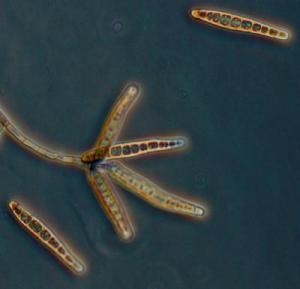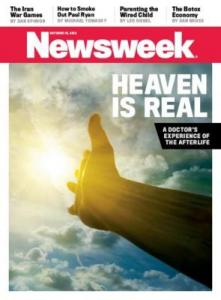On science blogs this week: Hell
THE LATEST ON FUNGAL MENINGITIS FROM AN INDUSTRIAL-STRENGTH COMPOUNDING PHARMACY. As I write, the Centers for Disease Control is reporting a total of 257 cases of fungal meningitis and 20 deaths traceable to contaminated injections of methylprednisolone acetate, a steroid painkiller from a huge compounding pharmacy that was operating almost like a pharma manufacturer in Massachusetts. The steroid was administered to nearly 14,000 patients before it was recalled. At Journal Watch, Stephen Baum points out that probably means more meningitis cases are to be expected.
The New England Journal of Medicine, bless its heart, has made it easy to get background and keep up with a comprehensive site aimed chiefly at providing information to clinicians. The NEJM site is free. Also free, of course, are the up-to-date case reports at the CDC site.
At the NPR blog Shots, Richard Knox says the outbreak is "shaping up to be a spectacular failure of consumer protection." Kevin Outterson, at the Incidental Economist, observes that the Food and Drug Administration has more regulatory authority over a drug factory in China than over a compounding pharmacy in Massachusetts. At Wonkblog, Sarah Kliff says one big hurdle is figuring out whether a particular compounding facility should be regulated by state authority or the FDA. There's a simple fix for this, according to David Williams at the Health Business Blog. Technically simple, that is; political factors may be another matter entirely.
An additional and somewhat scary complexity, brand new to me, is that lots of the meds administered in hospitals (including IV bags) are created in compounding pharmacies too, pharmacies in the hospitals themselves, a fact revealed by Roni Caryn Rabin at Well. And for more scariness, see The Pipeline for Derek Lowe's explanation of the terrible side effects of Amphotericin B, the best available therapy for fungal meningitis. "If you're taking it," he says, "you are probably in a bad way."
OMG, THANKS TO MENINGITIS, HEAVEN IS REAL! I can't help thinking that there's a connection between Newsweek announcing this week that it is giving up its paper product and going entirely digital and the magazine's recent cover story announcing that Heaven is Real. Examples of a publisher's desperate last resorts, both of them.
"Heaven is real," is of course the claim of neurosurgeon Eben Alexander, who claims he entered heaven during a coma consequent on meningitis. Which claim has of course elicited much commentary from scientists and the science-minded, commentary that ranges from contemptuous to scathing.
Contemptuous and scathing are always fun, but neurologist Steven Novella, at Neurologica, provides a useful scientific explanation for Alexander's experiences that is based firmly on what we know about the brain. Novella doesn't deny Alexander's experiences of clouds and angels, only the claim that they happened while his cortex was inactive. Novella argues
They occurred while his brain function was either on the way down or on the way back up, or both, not while there was little to no brain activity. During this time he would have been in an altered state of consciousness, with different parts of his cortex functioning to different degrees. This state is analogous to certain drug-induced mental states, or those induced by hypoxia and well documented, and there is even some overlap with the normal dream state. All of these are states in which the brain’s construction of reality is significantly different from the normal waking state.
This process, Novella notes, would have taken hours, maybe even a day or more. Even more important are the months afterward when Alexander sought to explain his near-death experiences to himself. Novella's analysis:
The story that Alexander now tells is the attempt by his waking brain to make sense of experiences that occurred in an altered mental state. We therefore don’t know what he really experienced, only what his waking brain interprets and remembers about what his partially functioning brain experienced.
From neurological we turn to commercial explanations, which are provided in Knight Science Journalism Tracker Paul Raeburn's post, and then repeated a few days later at HuffPo. Paul reveals the amazing news that Alexander has written a book, a book that is already near the top of Amazon's best-seller list although it isn't even out yet. And that Alexander's current place of business is a publicly supported Virginia nonprofit called Eternea, which seeks, among other things, "to enhance the understanding of spiritually transformative experiences."
I hope, for the sake of neurosurgery patients everywhere, that his gig at Eternea means Alexander is no longer in the OR wielding his scalpel. The world needs neurosurgeons who keep up with the neuroscience literature. Neurosurgeons who understand that our prior beliefs shape our interpretation of events and our memories of them. Who are knowledgeable about the nature and stages of coma. Who, in short, know something about the human brain.
NEXT WEEK, THE ANNUAL SCIENCE WRITERS MEETING, #SCIWRI12. So I won't be here as usual next Friday. I'll be at the annual meeting of the National Association of Science Writers, this year in North Carolina's Research Triangle, and preparing for the Saturday morning NASW Workshop session I organized. That would be Making Book on Ebooks: Writing Science and Medical Ebooks in the Real World.
The session stars two top science writers, Carl Zimmer and Deborah Blum, plus lots of audience participation from other medical and science writers. Ebooks are a complex and shape-shifting topic, but they are also the real world of being an author these days.
I will be posting a handout with links to a great deal of very practical information on writing and marketing ebooks, both self-published and via commercial publishers. So even if you can't make it to the ebook session next Saturday, you can profit from accumulated wisdom on the topic. I'll post the URL here and tweet it too @tamfecit. Keep up with the entire meeting @ScienceWriters, hashtag #sciwri12. Back here in a couple weeks.


